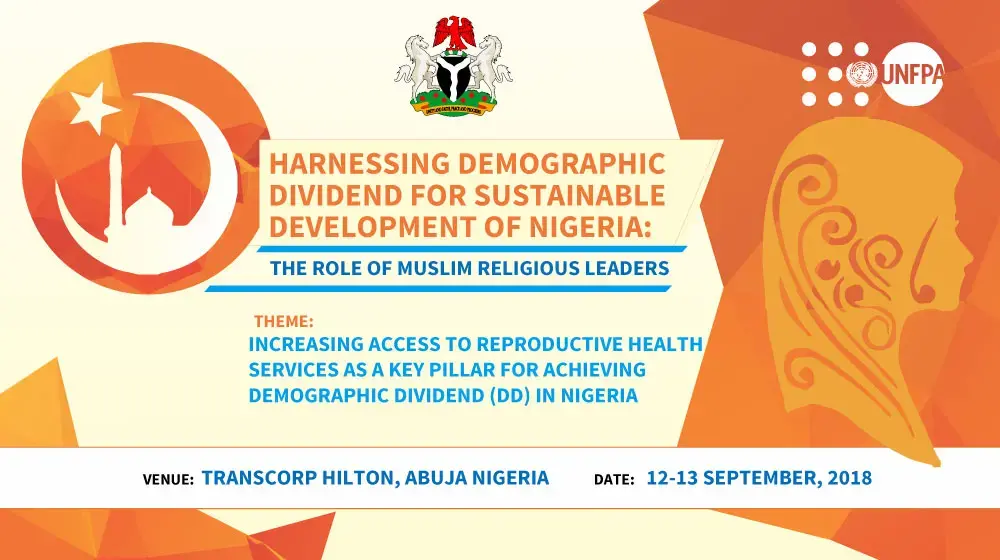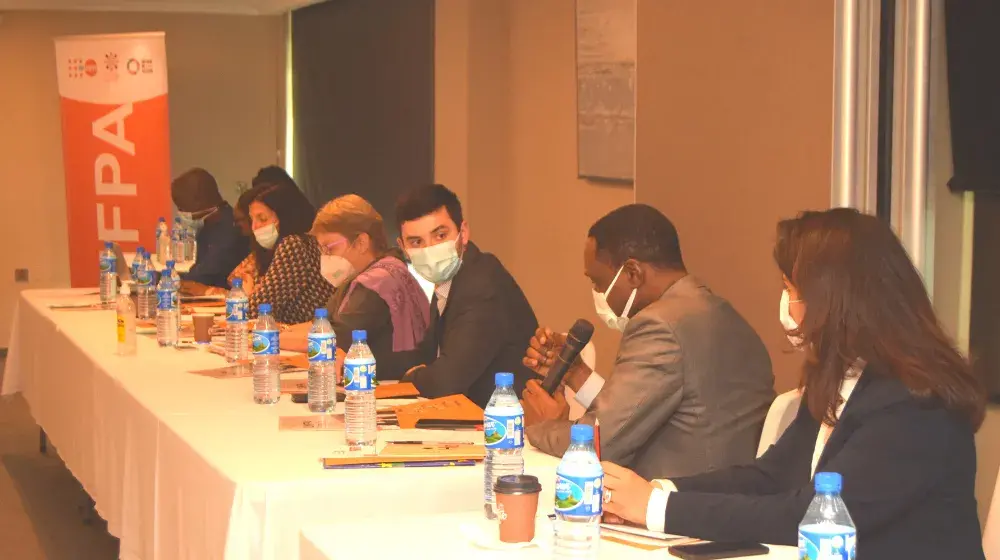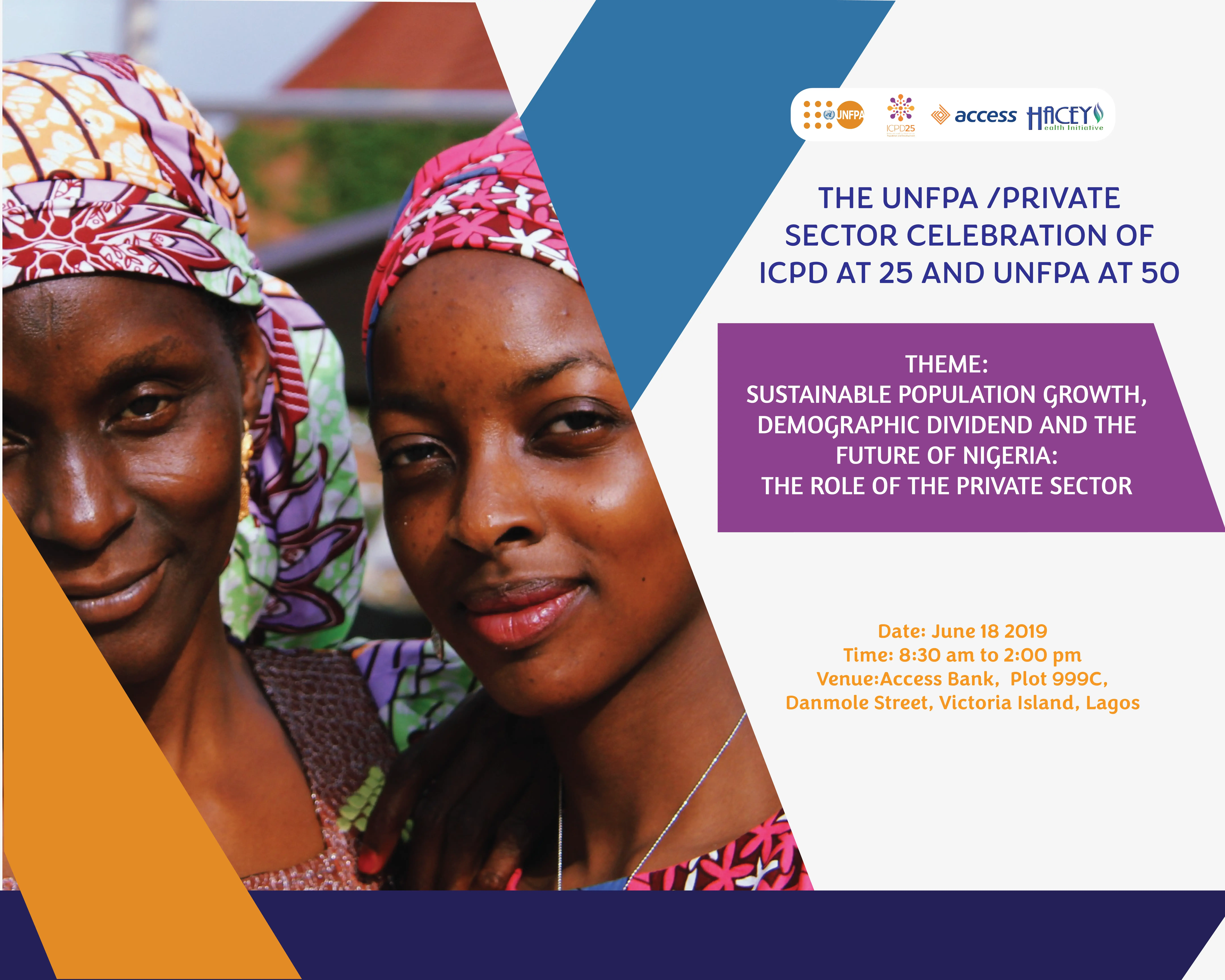HARNESSING DEMOGRAPHIC DIVIDEND FOR SUSTAINABLE DEVELOPMENT IN NIGERIA THE ROLE OF MUSLIM RELIGIOUS LEADERS 12-13 SEPTEMBER, 2018
UNFPA Nigeria with support from West and Central African Regional Office organized the biggest ever conference of Muslim religious leaders to discuss their role in demographic dividend. The two day conference was offcially opened by the Vice President of the Federal Republic of Nigeria, Prof. Yemi Osibanjo. After the two day deliberation, the leaders reached consensus around sensitive issues such as family planning and pledged to lead a radical social norm change that will transform Nigeria.
VICE PRESIDENT YEMI OSIBANJO CAUTIONS AGAINST POPULATION TIME BOMB
Vice President Yemi Osibanjo has emphasised the need to support the growing population of Nigerian youth in order to ensure that they do not become a liability in the future. Osibanjo stated this while formally declaring open the two-day forum which particularly focused on Nigeria’s Muslim religious leaders. He pointed out that taking in to consideration the statistics that Nigeria is the most populous nation in Africa, with an estimated population of over 198 million that is expected to double by 2050, it is important for the country to grow its economy to avoid a ‘population time bomb'. The vice president said: in doing this, ‘individual families must be key to attaining a demographic dividend (DD) by ‘prioritising the education and health of their dependents.” He said the federal government recognizes the importance of investing in the growing economy and has therefore engaged over 5000 graduates in its social intervention and empowerment scheme. While acknowledging the role of both religious and traditional rulers in achieving a population structure that would add value to Nigeria’s economy, the Vice President said they also have the responsibility to hold the government accountable, so that the nation's resources meets the needs of all Nigerians. Minister of Health Prof. Isaac Adewole recalled that in 2017, the federal government had launched a roadmap to harness the ‘demographic dividend'. He urged religious and traditional rulers to support the drive to build an economically beneficial population. The UNFPA Regional Director for West and Central African Region, Mr. Mabingue Ngom, while welcoming the religious leaders, made a strong case for demographic dividend and urged the Emirs to play their critical role as community leaders and custodians of social norms to help Nigeria move forward with the DD agenda. Also speaking, The UNFPA, Regional Director for West and Central Africa Region, represented by UNPFA Country Representative a.i , Dr. Eugene Kongnyuy, explained that demographic dividend is the economic growth that comes from a population structure with a larger work force and less dependents. He said studies have shown that Nigeria could reap DD, but it must invest in the education and health of women and children.
UNFPA IDENTIFIES RELIGIOUS, TRADITIONAL LEADERS AS KEY TO REAP DEMOGRAPHIC DIVIDEND Regional Director, UNFPA West and Central Regional o ce, Mabingue Ngom has described religious and traditional rulers as very strategic in achieving demographic dividend. In his opening remarks at the two day consultative forum on harnessing Demographic Dividend for sustainable national development in Nigeria, Mabingue Ngom noted that the religious and traditional rulers are the ones who lead the people at the community level and that this makes them very strategic in driving the changes needed to attain the population structure that would guarantee demographic dividend. He cited Burkina Faso, Indonesia, and other countries where religious and traditional rulers are taking the lead in this direction. The UNFPA Regional Director noted that Nigeria is very central in achieving Demographic Dividend in Africa in view of its expanding population with high dependency ratio of young persons. Earlier, during proceedings, the Acting Country Director of UNFPA, Dr Eugene Kongnyuy explained that demographic dividend is the economic growth potential that would result from shift in a population age structure, mainly when the share of the working population is larger than the non working population. He added that the youthful dependent population could be a liability rather than an asset, if not properly managed to be productive. Further to this, In his remarks, the Chairman, National Population Commission, Eze Duruiheoma SAN expressed satisfaction with the zeal religious leaders are showing towards ensuring that Nigeria reap demographic dividend. He however identifies education as key to achieving a more advantageous population structure. A general consensus agreed on during proceedings was the existential importance advocating for educational foundation for girl child held for harnessing the demographic dividend.
MATERNAL HEALTH SENATE MOVES TO MAKE HEALTH INSURANCE COMPULSORY
The chairman of the Senate Committee on Health, Senator Lanre Tejuoso revealed that the Nigerian senate is making progress in enacting a law to make health insurance compulsory. It is part of measures to improve the health of all Nigerians, especially women and children. Senator Tejuoso said the senate is already working on repealing the National Health Insurance Act to provide for compulsory health insurance. He however added that the NHIS must subsidize premium payment for those that cannot afford it. The lawmaker emphasised that it would be counterproductive to make health insurance compulsory without subsidising premium, explaining that most countries that have reaped a demographic dividend in the area of health have compulsory health insurance policy.
KANO EMIRATE CHAMPIONS END TO EARLY CHILD MARRIAGE
The Kano emirate in northern Nigeria has taken a bold step in reversing the practice of early child marriage. The Emir of Kano, Muhammad Sanusi, was represented at the two-day conference by the Talban Kano, Ahmed Ibrahim, who said a significant milestone has been reached in its advocacy of the issue. The Talban explained that the Emir has encouraged his subjects to get their daughters properly educated before giving them out in marriage. He said the Emir was worried over the increase in cases of Vesico Vaginal Fistula and the girl child out of school syndrome arising from early marriage. "The Emir has therefore established a VVF centre to cater for victims and has built a girls' secondary school to enhance girl child education. These are the exemplary measures he had taken for his subject to re ect and change for the better." He also noted that the Emir is concerned over the way some men randomly divorce their wives and then neglect their parental responsibilities. Talban said that "he is therefore proposing a law to protect women and children and discourage (the) recklessness of men against women."
UNFPA DEPUTY REP/REPRESENTATIVE A.I. - HOW TO ACHIEVE DEMOGRAPHIC DIVIDENDS IN NIGERIA
For Nigeria to enjoy demographic dividends, it must ensure a significant reduction in fertility rate and improvement in life expectancy. UNFPA Deputy Rep/Representative a.i. , Dr. Eugene Kongnyuy explained that when fertility rate drops, it leads to fewer numbers of children and an increase in the working population. This significantly impacts on the nation's economy and families. He explained further that when life expectancy is guaranteed through quality health services, it diminishes the tendency to have so many children, as people are more certain that the few children they have will survive. Dr. Eugene also emphasised that the country must heavily invest in education and ensure implementation of economic policies that would create jobs. He added that the country must ensure good governance and create opportunities for women to work. While acknowledging the role of religious and traditional rulers in reaping demographic dividends, the UNFPA Deputy Rep/Representative a.i. explained that a country's population policy is determined by the prevailing population structure. He cited Asian countries that have reaped demographic dividends as a result of appropriate population policies.
MUSLIM LEADERS REITERATE COMMITMENT TO REPRODUCTIVE HEALTH OF WOMEN
Muslim religious and traditional rulers have emphasized, once again, the need to intensify and sustain advocacy in promoting reproductive health of women. This was part of the consensus yesterday at the beginning of a two day consultative forum tagged: ‘harnessing demographic dividend for sustainable national development in Nigeria: the role of Muslim leaders.’ The consultative forum, organized by the United Nations Population Fund (UNFPA) in collaboration with the Nigeria Supreme Council for Islamic A airs (NSCIA) is predicated on increasing access to reproductive health services as a key pillar for achieving demographic dividend in Nigeria. In his good will message, the Sultan of Sokoto and President of NSCIA, Alhaji Muhammadu Sa’ad Abubakar III emphasized that reproductive rights of women is not simply for the population control but safeguarding the health of women and ensuring a sustainable family structure. Similarly, the Sultan who was represented by the Emir of Shonga, HRH Alh (Dr) Haliru Yahaya mentioned that women should be encouraged to embrace family planning to enhance their reproductive health and welfare of the family. He noted that most Imams have come to appreciate and embrace the importance of birth control in order to avoid producing children they cannot cater for. The Sultan therefore urged the Imams to preach relevant verses of the Holy Quran for their followers to emulate the virtues of bringing forth children they can cater for. Also speaking, the Emir of Ke represented by Prof. Salisu Shehu prayed God to grant participants the wisdom to contribute ideas that would enhance the educational rights and reproductive health of women. On his part, representative of the Sultan Foundation for Peace and Development (SFPD), Alhaji Amin Imam said the foundation is a core partner of the UNFPA and has recorded signi cant gains in promoting issues concerning women. He expressed optimism that the conference will come up with new approaches to sustain the gains so far made.





